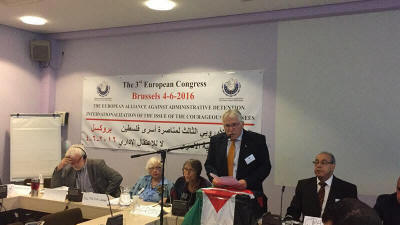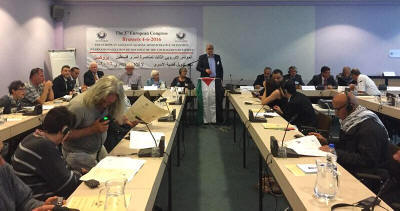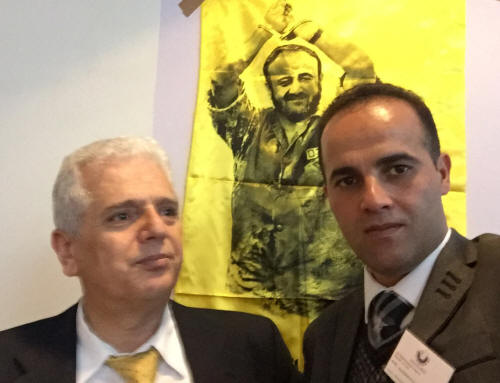Liebe Gäste, liebe Abgeordnete,
ich begrüße Sie im Namen der “European
Alliance in Defence of Palestinian Detainees“.
Der Titel der Konferenz lautet „Parliamentarians
against Administrative Detention“.
Es gibt aktuell circa 650 administrative
Häftlinge, und ich werde diese Art der
willkürlichen völkerrechtswidrigen Haft
analysieren.
Das Prinzip der Administrativhaft stützte
sich auf eine Verfügung des militärischen
Befehlshabers der besetzten Gebiete, des
Generalstabs in Israel oder des
Verteidigungsministers, bis das Gesetz
geändert wurde:
Wer eine solche Haftanweisung erlangen
konnte, war nicht verpflichtet, irgendetwas
mit gerichtsfesten Beweisen zu belegen. Es
genügten Verdachtsmomente oder Erwägungen,
die sich auf vertrauliche Informationen des
Sicherheitsdienstes stützten, die darauf
hinwiesen, dass der Mann eine Gefährdung für
die Sicherheit in den besetzten Gebieten
darstellte. Die Zulässigkeit dieser Haft
basierte auf der Verordnung III der
Notstandsgesetze aus der britischen
Mandatszeit (1945). Übertragen auf die
besetzten Gebiete diente sie im Laufe der
Jahre zu Massenverhaftungen, ganz besonders
zur Zeit der Intifada. Während der ersten
zwei Jahre der Intifada stieg die Zahl der
Administrativhäftlinge bis auf etwa 5.000.
Das Erlassen solcher Verfügungen und die
Kontrolle darüber wurden vereinfacht, für
die Behörden bequemer gestaltet, um eine
rasche Niederschlagung des Aufstands ohne
überflüssige Verzögerungen durch das
Gerichtswesen sicherzustellen.
Basierend auf diesen Verordnungen aus der
Mandatszeit wurden die Militärgerichte
etabliert. Aus ihnen schöpfte die
Militäradministration in den arabischen
Gebieten in Israel ihre Kraft und Macht. Sie
ermöglichten die Deportation von Menschen,
die Zerstörung von Häusern und
Zensurmaßnahmen.
Was haben jüdische Rechtsanwälte während des
britischen Mandats dazu gesagt?
Am 7. Februar 1946 sagte Dr. Dunkelblum,
Richter am Obersten Gericht: „Diese
Notstandsverordnungen stellen eine Gefahr
für die ganze jüdische Gemeinde dar. Für uns
Rechtsanwälte jedoch sind sie von ganz
speziellem Interesse: Es liegt hier ein
Bruch mit den elementaren Rechtsbegriffen
vor. Die Verordnungen sanktionieren die
absolute Willkür der administrativen und
militärischen Behörden.“
Die Administrativhaft wurde routinemäßig
verlängert, und die Einspruchskommissionen
stützten sich dabei fast zu hundert Prozent
auf die Entscheidungen des örtlichen
Kommandanten. Das Paradoxe daran war, je
mehr einer von Frieden und Verständigung
zwischen den Völkern sprach, desto bitterer
war sein Schicksal. Dies widerfuhr zum
Beispiel Al-Aruri, einer herausragenden
Persönlichkeit unter den Palästinensern, der
ausgezeichnete Beziehungen zum israelischen
Friedenslager unterhielt. Er wurde 1974 in
Administrativhaft genommen, als er von
seinem Studium in der Sowjetunion
zurückkehrte. Vor der Kommission für die
Koexistenz mit Israel bestand er jedoch auf
dem Recht des palästinensischen Volkes, ohne
Besatzung zu leben. Nach seiner Rede mussten
wir den Raum verlassen, und der Kasten mit
den Geheimdokumenten wurde geöffnet. Wir
hatten mehrfach gefragt, was der Grund für
seine Verhaftung war. Während der ganzen
vier Jahre seiner Haft war die einzige
Antwort, die wir jemals darauf erhielten,
dass es sich um Gründe der regionalen
Sicherheit handele… Schließlich wurde er
deportiert.
Ich habe während meiner juristischen
Tätigkeit versucht, viele Hunderte
Administrativhäftlinge zu verteidigen, aber
vergebens. Das war ein Kampf gegen Phantome,
und so habe ich es auch immer beschrieben.
So ist die Lage auch heutzutage nach fast 50
Jahren der Besatzung und Entrechtung der
Palästinenser. Viele hungerstreikende
Administrativhäftlinge gerieten dabei an den
Rand des Todes, so wie jetzt der Journalist
El Qik. Ich habe versucht, sie zu retten.
Aber die israelische Administration hatte
kein Erbarmen, hat das Völkerrecht und die
elementaren Menschenrechte mit Füßen
getreten.
I would like now, at this moment, to share
with you something more of my experience:
Then in May 1990, and this year in April.
In 1990 I decided to close my office in
West-Jerusalem, as a matter of protest
against the rotten judicial system
pertaining the Palestinians under Israeli
occupation. The “Washington Post”
interviewed me for their Sunday Final
Edition of 13th May as follows:
Israeli Defender of Arab Rights Quits in
‘Despair and Disgust’;
Lawyer for Palestinians Rarely
Won a Case in 23 Years
Jackson Diehl, Washington Post Foreign
Service
For 23 years, ever since Israel seized
control of the West Bank and Gaza Strip, a
tenacious lawyer named Felicia Langer
has haunted the crowded courtrooms where the
army administers justice to rebellious
Palestinians. Prosecutors seeking summary
convictions have had to bear her
interference; defendants, with little hope
of mercy, have counted on her passionate
summations to affirm their dignity.
Langer, a 59-year-old Holocaust survivor,
has rarely won a case. And yet for years,
when Arabs have been arrested on political
charges, faced deportation or the demolition
of their homes, or fallen victim to
soldiers’ brutality, their families
have looked for justice at her shabby
Jerusalem office.
Now, as Israel’s military machine
relentlessly grinds down the 30-month-old
Palestinian Intifada, or uprising in the
occupied lands, Langer has decided to quit.
She has closed her Jerusalem office. Two
months from now, she is leaving for Germany
to take an appointment as a university
lecturer.
But first, Langer has one last appeal to
make. Sitting formally in a desk chair,
neatly attired in a flowered print dress,
she delivered a long, well-prepared
testimony of a career she described as a
failure.
“I want my quitting to be a sort of
demonstration and expression of my despair
and disgust with the system, and maybe as a
proof that something must be done to grant
protection to the Palestinians in the
occupied territories,” she said, speaking
smoothly in accented but precise English.
“Because for the Palestinians,
unfortunately, we can’t obtain justice.”
Langer’s last pleading describes a judicial
system in the occupied territories that,
swamped by the army’s mass arrests, has lost
every semblance of due process or respect
for human rights since the onset of the
intifada. It lambastes a series of rulings
by Israel’s Supreme Court that have
institutionalized house demolitions,
deportations and detention without trial as
legitimate tools of order. And, with a touch
of melancholy, it describes a 23-year effort
by one attorney to make the judicial system
into a legitimate channel for the anger and
frustration of the Palestinians – a crusade,
Langer says, has achieved almost nothing.
“I realized that all this time, by bringing
Palestinians to the courts, I had been
legitimizing the system, but the system had
not brought the Palestinians any justice,”
she said with glistening eyes. “And I
decided I couldn’t be a fig leaf for this
system anymore. It was very painful for me
to see this, but I couldn’t avoid it.”
In the late 1970s, Langer became involved in
the most celebrated scandal ever to engulf
Israel’s secret police, the Shin Bet, after
Arab suspects, who hijacked an Israeli bus,
died in police custody, prompting a
subsequent coverup. Langer represented the
families of the Arabs who died. She also
defended leading Palestinian political
figures and argued for the rights of
Palestinian universities and economic
institutions.
Much of the time, she said, she was proud of
her work. “Those years were exhausting and
trying,” she said, “but I can’t say it was
completely futile. It was worthwhile to try
it, worthwhile to explore; sometimes you
could ease somebody’s pain, sometimes people
just wanted to have a trial and show their
own dignity, and sometimes you could just
show the wrongful evidence of the
prosecution.” Even the modest satisfactions,
however, disappeared once the intifada began
in December 1987. “We were always aware that
these were military courts appointed by the
military authorities with the clear aim to
impose military order on the territories,”
she said. “But when the intifada began, the
situation became impossible. The courts
started to be overwhelmed by the massive
arrests, and it started to resemble a
factory, or a supermarket for setting
punishment that only slightly resembled the
administration of justice.”
She decided to concentrate on appeals to the
Israeli Supreme Court, hoping to win
decisions outlawing some of the army’s most
repressive tactics, or at least forcing
investigations of cases of alleged excesses.
Again, she said, she failed. “I was going
from one hospital to the next, writing
complaints, and I was thinking, maybe here
and there a complaint will help stop this
policy. But I didn’t succeed in Gaza, I
didn’t succeed in Nahalin. Then I tried to
stop the use of plastic bullets by the army,
and I didn’t succeed.
Then I started taking cases of individual
deaths of Arabs in which there was a
clear-cut case of killing or murder. But
with the exception of two (Jewish) settlers
who were tried for wrongful killing, I
didn’t get anywhere. It was very hard to
prove anything against the army; the local
people were afraid to testify, and I could
never get anything from the Israeli side.
“The last straw,” Langer said, “was
appealing to the case of house demolitions.
I had one case of several houses that were
to be destroyed in Kalkilya as a collective
punishment there. And when I went to the
High Court and tried to appeal against it
under international law, I was cut off. The
judges said, ‘Felicia Langer, you know that
we have already ruled under every
conceivable circumstance that house
demolitions are not a violation of
international law.’ And I realized that
they were right, that we had lost all these
battles long before and I had nothing more
to argue.”
The
“Washington Post” of April 2016 brought a
story by William Booth under the title
“There is what happened when some famous
writers want to visit some hardcore Jewish
settlers” (nachzulesen im Palästina Portal).
Arriving aboard of a tour bus – accompanied
by a former machine-gunner, now a human
rights activist, Yehuda Shaul, an
international delegation of pretty famous
writers came to the heart of the old city to
see themselves – how 850 hardcore Jewish
settlers, protected by 650 young Israeli
soldiers, live among 200.000 angry
Palestinians. It is Hebron. The writers did
not like what they saw, the settlers did not
like the writers, much either their hosts
(the organisation “Breaking the Silence”).
“The Israeli military occupation is the most
grievous injustice I have seen in my life”,
Michael Chabon, Pulitzer Prize-Winner, told
the “Forward”, a Jewish newspaper, a day
after having seen Hebron. “Liars”, the
settlers shouted at the writers and at
Yehuda Shaul. “Do not believe him, he is a
traitor! The Israeli Army is the best in the
world!”
The writers who were guided by Yehuda Shaul
on a visit to Hebron, organized by “Breaking
the Silence”, are planning to write essays
about this tour through a sterilized zone
where Palestinians are forbidden to walk.
The Palestinian shops were all closed, the
once thriving vegetable and meat markets are
but a memory.
The author Ajelet Waldman, a Jew, said,
“There are not two sides to an occupation,
there are two sides of a conflict, but there
are not two sides of an occupation! There
are occupied and the occupiers!”
That’s a piece of information from the
“Washington Post” of today!
At the end I am returning to the
administrative detention: A detention
without an accusation, the detainee is
without any remedy, his lawyer is without
any hope…
The lauded “only democracy in the Middle
East”, Israel, has maintained this judicial
scandal for many years, with impunity, and
therefore can afford to continue.
Israel is instrumentalizing our dead, the
victims of the Holocaust. It is a shame!
People with a conscience, everywhere, have
to put an end to this, for the sake of
justice and humanity!
United
we can !


Dr. Ahmad Muhaisen und Mahmoud Zabin aus Ramallah (Er arbeitet in einem Büro der PLO in Ramallah) im Hintergrund Marwan Barghuthi
